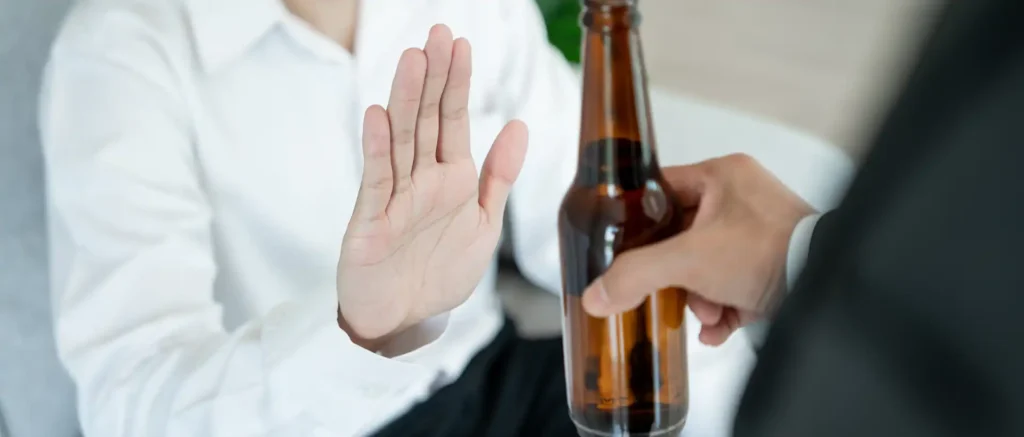How to Stop Binge Drinking: Practical Steps to Regain Control

If alcohol consumption is starting to affect your health or daily life, it may be time to make a change. This guide on how to stop binge drinking offers practical steps to help you understand your patterns, reduce harmful behaviour, and regain control. With the right support, making healthier choices becomes not only possible but also sustainable.
Understanding Binge Drinking
Binge drinking refers to consuming a large amount of alcohol in a short period, typically four or more drinks for women and five or more for men within about two hours. While it’s often viewed as part of socialising, this pattern of drinking poses significant health risks.
For example, it can impair your judgement, increase your blood alcohol concentration, raise the risk of accidents and injuries, cause memory lapses, and over time, contribute to serious issues like alcohol abuse and mental health disorders.
Recognising the Signs and Symptoms of Binge Drinking
Binge drinking can impact nearly every aspect of your life, from physical health to emotional stability and day-to-day functioning. Hence, recognising the early signs gives you a better chance to make changes and seek the right support before the pattern gets problematic.
Physical Symptoms
The physical effects of excessive alcohol intake often appear quickly, especially during or shortly after a heavy drinking episode. For example, you might notice slurred speech, impaired coordination, nausea, headaches, or sensitivity to light and sound.
These symptoms are your body’s immediate response to excessive alcohol content and can signal that your drinking habits are becoming risky.
Emotional Symptoms
Binge drinking may lead to heightened anxiety, sudden mood shifts, or episodes of depression. You may also wake up feeling regret, guilt, or emotional numbness, particularly if you can’t recall everything that happened.
When these emotional symptoms occur regularly after drinking, they suggest that alcohol is affecting more than just your mood, and it may be a sign of disruption to your mental health.
Patterns of Behaviour
Binge drinking also shows up through behavioural changes. You might find yourself drinking quickly just to feel drunk when you’re surrounded by others who are doing the same because of social pressure.
Over time, you may start missing responsibilities, arriving late to work or school, or skipping important tasks. Some people begin to hide their drinking or pretend it’s not a problem, even as it starts costing them time, money, or peace of mind.
Negative Health Effects of Binge Drinking
Binge drinking comes with several negative health effects that can be either short-term or long-term.
Short-Term Effects
In the immediate aftermath of binge drinking, your body and mind can react in intense and dangerous ways. Some of the most common short-term effects you might experience include confusion, nausea, vomiting, and lapses in memory.
You may also engage in risky behaviours like unprotected sex, aggressive outbursts, or driving under the influence, actions that can lead to accidents, injuries, or legal consequences.
Long-Term Effects
When you engage in binge drinking regularly, the long-term health risks begin to build. Specifically, your repeated exposure to high levels of alcohol increases your chances of developing liver disease, cardiovascular problems, and chronic gastrointestinal issues.
Your mental health can also suffer, with anxiety, depression, and cognitive impairment becoming more likely over time. Aside from that, regular binge drinking can also lead to alcohol dependence or alcohol use disorder, which makes it increasingly difficult to stop or moderate your use.
Does Excessive Drinking Lead to Alcohol Addiction?
Excessive drinking can gradually develop into alcohol addiction, especially when it becomes a repeated pattern. Over time, your brain adapts to frequent alcohol consumption, which makes it difficult for you to control how much or how often you drink alcohol.
This often leads to increased tolerance, stronger cravings, and a growing dependence on alcohol. Without early support, what starts as occasional binge drinking can turn into a chronic and harmful cycle.
Risk Factors and Causes of Binge Drinking
A single factor rarely causes your binge drinking. Instead, it stems from a combination of psychological, social, and genetic factors that influence how and why you drink.
Understanding these underlying causes can help clarify the motivations behind binge drinking and point toward healthier ways to cope.
Psychological Triggers
Emotional challenges like stress, anxiety, and depression are common causes of binge drinking. For instance, alcohol becomes a way to escape overwhelming feelings or silence intrusive thoughts temporarily.
When emotional pain feels too heavy, drinking can seem like the fastest way to cope, especially if other support systems aren’t in place.
Environmental and Social Factors
Your surroundings and the people you interact with can strongly influence your drinking habits. To be specific, peer pressure, especially in youth and early adulthood, usually makes your binge drinking seem normal in social settings.
In addition, cultural attitudes toward alcohol also matter. If drinking heavily is widely accepted or celebrated in your community, you may feel less aware of the potential risks. Easy access to alcohol, along with frequent exposure to parties, nightlife, or media that glorify drinking, can further increase your chances of overconsumption.
According to the National Institute on Alcohol Abuse and Alcoholism, such environmental exposure, particularly among young adults, can significantly contribute to the binge drinking problem.
Genetic Influences
Genetics can also play a role in binge drinking. If you have a family history of alcohol abuse and alcoholism, your risk may be elevated. That’s because some people inherit traits that affect how their bodies metabolise alcohol, which makes them more prone to drink heavily or experience stronger cravings.

Practical Strategies on How to Stop Binge Drinking
Breaking the cycle of binge drinking starts with awareness and intention. By setting your clear goals, identifying what drives your drinking, and replacing old patterns with healthier ones, you can begin to regain control.
Setting Realistic Drinking Goals
One of the most effective ways to reduce binge drinking is to set specific and achievable goals for your alcohol use problem.
You might decide to avoid drinking on certain days, limit how many drinks you have in one sitting, or designate alcohol-free zones in your life, like family gatherings. Writing these goals down makes them more concrete and helps strengthen your commitment.
Identifying and Avoiding Triggers
Understanding what leads you to binge drink is key to creating lasting change. Notice if your triggers may include emotional states like stress or loneliness, specific environments like bars or house parties, or social dynamics that make it hard to say no.
You can also take the time to reflect on your most common triggers and create a plan for managing them. This might involve choosing different social settings, limiting time with people who encourage heavy drinking, or bringing a supportive friend when you know temptation will be high.
Building Healthy Routines
Replacing your problematic habits with more fulfilling routines can reduce your urge to drink. Try incorporating regular activities that bring you enjoyment or a sense of connection, such as exercise, creative hobbies, volunteering, or joining groups that support sober or mindful living.
If your trigger usually happens during social situations, try bringing your own alcohol-free beverages to events or suggest get-togethers that aren’t focused on drinking, such as coffee meet-ups, game nights, or outdoor activities.
Generally, creating a lifestyle that supports your goals not only helps prevent relapse but also adds meaning and structure to your days, which makes it easier for you to maintain long-term change.
Accessing Support and Treatment Options
If you’re working to stop binge drinking or manage related mental health concerns, it’s important to know that support is available and accessible. Choosing the right combination of support makes a significant difference in building a lasting recovery.
Counselling and Therapies
Speaking with a therapist provides a safe space to explore your thoughts, behaviours, and underlying emotional challenges. Therapy helps you process difficult experiences, manage triggers, and develop healthier coping strategies.
Peer Support Groups
Peer support groups can offer you valuable encouragement and connection from people who’ve experienced similar challenges. These groups, which can be attended in person or online, focus on fostering mutual understanding, sharing coping strategies, and providing emotional support.
Medical and Pharmacological Interventions
Medical treatment can also play a key role in managing the psychological or physical effects of binge drinking. Medications like antidepressants, anti-anxiety drugs, or, in some cases, anti-craving medications may be prescribed to support your recovery.
In more severe cases, additional support, such as psychiatric care or residential treatment, may be recommended to stabilise your health.
Maintaining Long-Term Sobriety
Recovery doesn’t end with stopping alcohol use, as it continues with daily choices and strategies that help you stay sober. Learning how to respond to challenges and building a strong personal foundation are key to maintaining your progress over time.
Relapse Prevention Techniques
Relapse often happens in stages, starting with emotional or behavioural changes before substance use begins again. Signs such as social withdrawal, skipping routines, or neglecting self-care can be early warning signs.
Having a relapse prevention plan helps you respond quickly, and this might mean staying connected through therapy, support groups, or regular check-ins to keep you focused and lower the risk of falling back into old habits.
Developing Coping Skills
Coping skills allow you to handle stress, cravings, and emotional setbacks in a healthy way. Practices such as deep breathing, mindfulness, journalling, or physical activity can help calm your mind and body during difficult moments.
Furthermore, maintaining a consistent daily routine, such as having regular meals, sleep, and exercise time, can also strengthen your resilience and reduce your vulnerability to relapse.
Your Healthier Routines Begin Here
We know it’s not easy to change something that’s become a way of coping, especially when it feels like no one truly understands what you’re going through. But always remember that help is available and recovery is achievable.
If binge drinking is getting in the way of the life you want, PROMIS is here to help you take that first gentle step. Our dedicated team can guide you on building a healthier routine to overcome your binge drinking.
Frequently Asked Questions
What Practical Strategies are Effective in Curbing Excessive Alcohol Consumption?
Set clear drinking goals and track your intake to help recognise your patterns and reduce harmful behaviour. Removing alcohol from your environment and choosing social activities that don’t involve drinking lowers the risk of relapse.
Can Psychological Interventions Help to Tackle Compulsive Drinking Behaviours?
Yes. For instance, Cognitive Behavioural Therapy (CBT) can help change your thought patterns associated with drinking, while Motivational Interviewing (MI) enhances your readiness to change.
What are the Dangers Associated With Binge Drinking?
Binge drinking can lead to alcohol poisoning, accidents, injuries, impaired judgement, risky behaviour, and long-term health problems like liver disease or alcohol dependence.
What Role Does Peer Support Play in Overcoming Alcohol Dependency?
Peer support groups offer a sense of community, accountability, and shared understanding, which can help reduce feelings of isolation. Regular participation often leads to stronger coping skills and long-term motivation.
How Might One Recognise and Address the Underlying Issues that Contribute to Alcohol Misuse?
Start by identifying emotional pain, stress, or past trauma that may be driving your alcohol use. Therapy can help you process these experiences and build healthier coping strategies.
What are the Best Ways to Manage Cravings and Avoid Relapse into Heavy Drinking Patterns?
To manage cravings, distract yourself with an activity, practice mindfulness to observe urges without reacting, and avoid known triggers. Having a clear plan and a support network, like therapy or peer groups, can also help you stay grounded. These strategies reduce the chance of cravings turning into relapse.
In What Ways Can Lifestyle Changes Assist in the Cessation of Chronic Alcohol Overindulgence?
Establishing routines like regular sleep, balanced nutrition, and exercise can stabilise your mood and reduce cravings. Replacing drinking with purposeful activities supports lasting change and helps reinforce your commitment to recovery.
